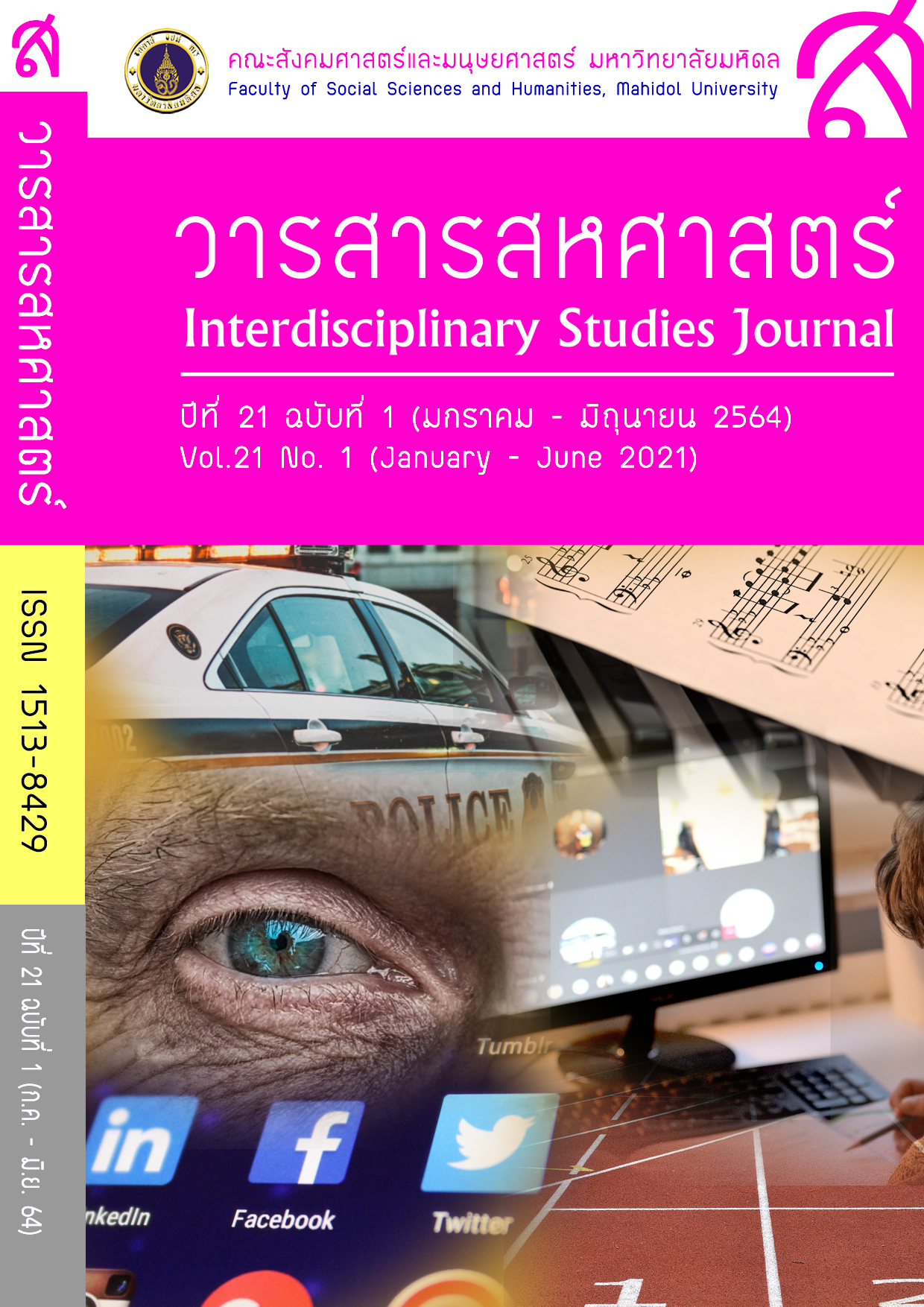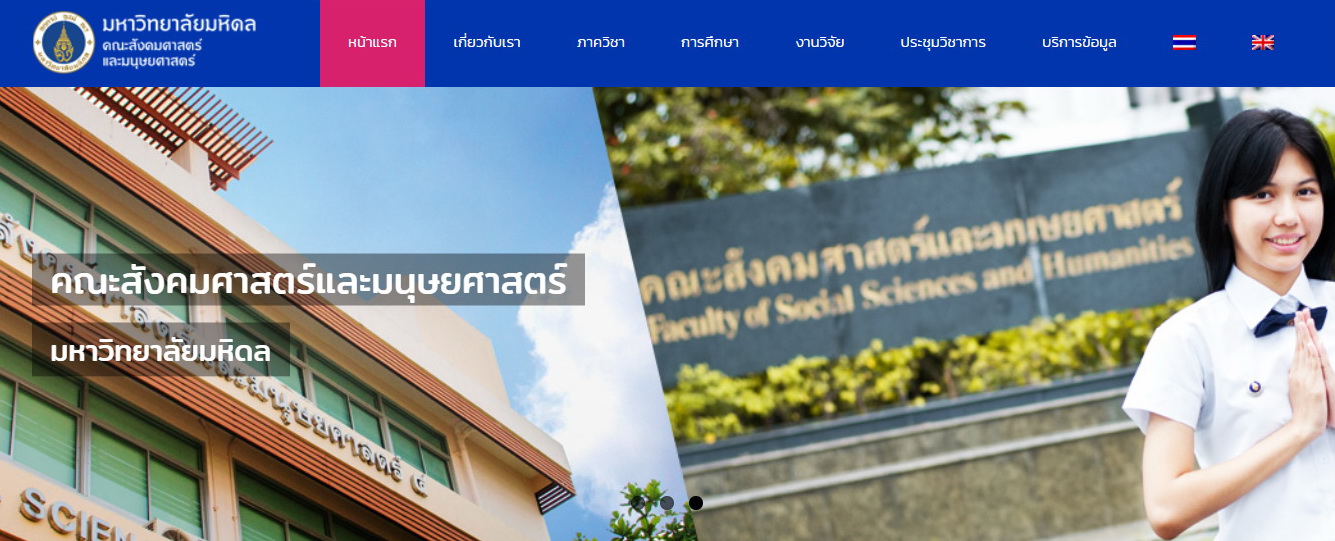ผลการเรียนรู้แบบโครงงานเป็นฐานผ่านระบบอีเลิร์นนิ่งรายวิชาระบบการจัดการเรียนรู้ออนไลน์
คำสำคัญ:
Project-based Learning, E-Learning, Online Learning, Learning Management Modelบทคัดย่อ
Project-based Learning (PjBL) enhances the learners to become the learners-center and reinforces the skills in the 21st century. When Project-based Learning is used together with the e-Learning System, it helps the learner achieve the project successfully. This research aimed to study through the learning achievement and learners’ satisfaction towards the Project-based Learning through the e-Learning system for the online learning management system course. The sample group was 31 undergraduate students, managed by the e-Learning system using the Moodle Learning Management System. The students were divided into seven groups, 4-5 persons per group. They were selected by the mixed Grade Point Average (GPA) and Pre-test/Post-test, including the project assignment of each group. The research result revealed that the students had the result of average point scores for the Post-test higher than the result of average point scores of the Pre-test by statistical significance through the contents of the two units. Every group of students could propose and send their project contributions in time. Furthermore, the project contributions of every group were evaluated from the instructor and classmates as having a quality at a good level. Besides, the students were satisfied from the learning model at a high level. Hence, the Project-based Learning Management Model through the e-Learning System can be extended the results to other courses further.
เอกสารอ้างอิง
Sutthirat. C. (2010). New learning management. Nonthaburi: Sahamitr Printing & Publishing.
Praphin, C., Kongmanus, K., Chiranuparp, C., & Kaewurai, W. (2019). The development of an instruction model for computer subject based on project-based learning with social media to enhance information communication and technology literacy for upper primary students. Journal of Education, 21(1), 30-47.
Wongdee, P. (2019). Activity-based learning model to enhance learning classroom action research ability for pre-service teachers of industrial education. Journal of Education, 21(1), 109-126.
Mora, P. (2018). Learning management using project-based learning: Alternatives of educational management for learners in the 21st century. Journal of Research and Curriculum Development, 8(1), 42-52.
Changkamanon, A., & Dullayachai, K. (2017). E-learning model development for the age of social network. The Far Eastern University academic journals, 11, 44-56.
Al-Gahtani, S. S. (2016). Empirical investigation of e-learning acceptance and assimilation: A structural equation model. Applied Computing and Informatics, 12, 27-50.
Almulla, M., A. (2020). The effectiveness of the project-based learning (PBL) approach as a way to engage students in learning. SAGE Open, 1-15.
Baldelovar, M. A. (2017). Evaluation on acceptance and usability of simulation ASE-learning tool. International Journal of Science and Research, 7(11), 339-341.
Brahim, B., & Lotfi, A. (2020). A Traces based system helping to assess knowledge level in e-learning system. Journal of King Saud University – Computer and Information Sciences, 32, 977-986.
Bravo, E. D. (2019). Audit analysis of students’ skills and attitudes towards e-Learning at the Cagayan State University - Carig Campus: Basis for innovating teaching and learning. International Journal of Science and Research, 8(5), 225-228.
Cary, I. (2020). How advancement in technology affect – 2020 Guide. Retrieved from: https://scholarlyoa.com/how-advancement-in-technology-affect-2020-guide/.
Christopher, P. (2020). The best learning management systems. Retrieved from: https://elearningindustry.com/the-best-learning-management-systems-top-list.
ELearning Industry. (2020). 5 eLearning trends that are dominating in 2020 (And 5 Predictions For 2021). Retrieved from: https://elearningindustry.com/5-elearning-trends-dominating-2020-predictions.
Fitton, I. S, Finnegan, D. J., & Proulx, M. J. (2020). Immersive virtual environments and embodied agents for e-learning applications. Peer Journal of Computer Science, 6, 1-22.
Francis, T., & Hoefel, F. (2018). True gen: Generation Z and its implications for companies. Retrieved from: https://www.mckinsey.com/industries/consumer-packaged-goods/our-insights/true-gen-generation-z-and-its-implications-for-companies.
Gerhana, M. T. C., Mardiyana, M., & Pramudya, I. (2017). The effectiveness of project based learning in trigonometry. Journal of Physics: Conference Series, doi:10.1088/1742-6596/895/1/012027.
Guo, P., Saab, N., Post, L. S., & Admiraal, W. (2020). A review of project-based learning in higher education: Student outcomes and measures. International Journal of Educational Research, 102, 1-13.
Gupta, V., Chauhan, D. S., & Dutta K. (2013). Incremental development & revolutions of
e-learning software systems in education sector: A case study approach. Human-centric Computing and Information Sciences, 3, 1-14.
Phumpuang, K., Thammetar, T., Natakuatoong, O., & Tantasanawong, P. (2020). The development of e-learning model by collaborative learning on social media to develop information literacy skills for undergraduate students of faculty of education. Journal of Education, 22(1), 29-44.
Kortam, N., Basheer, A., Hofstein, A., & Hugerat, M. (2018). How project-based learning promotes 7th grade students' motivation and attitudes towards studying biology. Action Research and Innovation in Science Education, 1(2), 9-17.
Lavanya, G., K. (2020). Enriching education through e-learning. International Journal of Science and Research, 9(5), 270-273.
Lee, L. T., & Hung, J., C. (2015). Effects of blended e-learning: A case study in higher
education tax learning setting. Human-Centric Computing and Information Sciences, 5(13), 1-15.
Li, C., & Lalani, F. (2020). The COVID-19 pandemic has changed education forever. This is How. Retrieved from: https://www.weforum.org/agenda/2020/04/coronavirus-education-global-covid19-online-digital-learning/.
Mbarek, R. (2016). E-learning effectiveness: An explorative study in the Tunisian context. International Journal of Science and Research, 6(12), 1054-1060.
Miller, E. C., & Krajcik, J. S. (2019). Promoting deep learning through project-based learning: A design problem. Disciplinary and Interdisciplinary Science Education Research, 1(7), 1-10.
Morrisson, M. K., & Nzuki, D. M. (2016). User acceptance and usage of e-learning
technologies: A theoretical review. International Journal of Science and Research, 5(12), 525-529.
Nizwardi, J., Rahmat, N., AbawiRahmat, N., & Aznil M. (2017). The seven steps of project based learning model to enhance productive competences of vocational students. advances in social science, education and humanities research, Retrieved from https://www.researchgate.net/publication/320470314_The_Seven_Steps_of_Project_Based_Learning_Model_to_Enhance_Productive_Competences_of_Vocational_Students/stats#fullTextFileContent.
Onengiye, G. M., & Chukwunazo, E. J. (2016). Development of a cloud based mobile interactive e-learning web platform for higher learning. International Journal of Science and Research, 5(7), 100-107.
Ozadowicz, A. (2020). Modified blended learning in engineering higher education during the COVID-19 lockdown-building automation courses case study. Education Sciences, 10, 292, 1-20.
Shahzad, A., Hassan, R., Aremu, A., Y., Hussain, A., & Lodhi, R. N. (2020). Effects of COVID‑19 in e-learning on higher education institution students: The group comparison between male and female. Springer Nature, 1-24.
Srivastava, B., & Haider, T. U. (2020). Personalized assessment model for alphabets learning with learning objects in e-learning environment for Dyslexia. Journal of King Saud University –Computer and Information Sciences, 32, 809-817.
Rana, H., Rajiv., & Lal, M. (2014). E-learning: issues and challenges. International Journal of Computer Applications, 97(5), 20-24.
Tamm, S. (2019). Advantages of e-learning. Retrieved from: https://e-student.org/advantages-of-e-learning/.
Tiwari, R., Arya, R. K., & Bansal, M. (2017). Motivating students for project-based learning for application of research methodology skills. International Journal of Applied Basic Medical Research, 7(1), S4-S7.
Vanishree, H. S., & Tegginamani, A. S. (2018). Problem-based learning (PBL) and its limitations. Journal of Multidisciplinary Dental Research, 4(2), 52-59

ดาวน์โหลด
เผยแพร่แล้ว
รูปแบบการอ้างอิง
ฉบับ
ประเภทบทความ
สัญญาอนุญาต
สหศาสตร์: วารสารสังคมศาสตร์และมนุษยศาสตร์ ให้ความสำคัญกับการคุ้มครองลิขสิทธิ์และสิทธิของผู้นิพนธ์ในการเผยแพร่ผลงานวิชาการ โดยมีวัตถุประสงค์เพื่อส่งเสริมความโปร่งใส ความถูกต้องตามหลักวิชาการ และสอดคล้องกับแนวปฏิบัติสากล ทั้งนี้ วารสารกำหนดนโยบายดังต่อไปนี้
|
1. การยอมรับเงื่อนไขการเผยแพร่ - ผู้นิพนธ์ที่ส่งบทความเพื่อตีพิมพ์ ต้องปฏิบัติตามนโยบายและเงื่อนไขการเผยแพร่ของวารสารโดยเคร่งครัด - การส่งบทความถือเป็นการยอมรับให้นำบทความเข้าสู่กระบวนการพิจารณาและการเผยแพร่ตามมาตรฐานของวารสาร |
|
2. การโอนลิขสิทธิ์ - เมื่อบทความได้รับการตอบรับเพื่อตีพิมพ์ ผู้เขียนโอนลิขสิทธิ์ของบทความให้แก่วารสาร - วารสารมีสิทธิ์เผยแพร่ ทำซ้ำ และเผยแพร่บทความในทุกรูปแบบ ทั้งสิ่งพิมพ์ เว็บไซต์ และสื่อออนไลน์อื่น ๆ |
|
3. สิทธิ์ของผู้นิพนธ์หลังการโอนลิขสิทธิ์ - ผู้นิพนธ์ยังคงมีสิทธิ์ใช้บทความเพื่อวัตถุประสงค์ทางวิชาการ เช่น การสอน การวิจัยส่วนบุคคล การใช้ประกอบวิทยานิพนธ์ หรือการเผยแพร่ในแพลตฟอร์มที่ไม่ใช่เชิงพาณิชย์ - การนำบทความไปใช้เพื่อวัตถุประสงค์เชิงพาณิชย์ ต้องได้รับอนุญาตจากวารสารก่อนเป็นลายลักษณ์อักษร |
|
4. การเผยแพร่ภายใต้สัญญาอนุญาตสาธารณะ (Creative Commons License) - บทความทั้งหมดในวารสารจะเผยแพร่ภายใต้สัญญาอนุญาต Creative Commons Attribution-NonCommercial-NoDerivatives 4.0 International (CC BY-NC-ND 4.0) - บุคคลอื่นสามารถเผยแพร่หรือแบ่งปันบทความได้โดยต้องให้เครดิตแก่ผู้นิพนธ์ต้นฉบับ แต่ห้ามแก้ไข ดัดแปลง หรือใช้ในเชิงพาณิชย์ |
|
5. ความถูกต้องของเนื้อหาและการใช้สื่อจากบุคคลที่สาม - ผู้เขียนต้องรับรองว่าบทความที่ส่งเพื่อตีพิมพ์เป็นผลงานต้นฉบับของตนเอง ไม่ได้ส่งซ้ำซ้อน (duplicate submission) และไม่ละเมิดลิขสิทธิ์หรือคัดลอกผลงานของผู้อื่น รวมถึงไม่มีการปลอมแปลงข้อมูล การตีพิมพ์ซ้ำ หรือการกระทำใด ๆ ที่ขัดต่อหลักจริยธรรมทางวิชาการ - ผู้เขียนต้องรับผิดชอบในการขออนุญาตใช้สื่อจากบุคคลที่สาม เช่น ภาพ ตาราง หรือกราฟิก และต้องอ้างอิงหรือให้เครดิตอย่างถูกต้องน |
|
6. ข้อจำกัดความรับผิดชอบ (Disclaimer) - บทความที่ได้รับการตีพิมพ์ในวารสารสหศาสตร์: วารสารสังคมศาสตร์และมนุษยศาสตร์ถือเป็นลิขสิทธิ์ของวารสาร - ข้อความ ข้อมูล และข้อคิดเห็นที่ปรากฏในบทความเป็นความรับผิดชอบของผู้เขียนแต่ละท่านโดยตรง มิได้สะท้อนถึงทัศนะหรือจุดยืนของกองบรรณาธิการหรือหน่วยงานที่เกี่ยวข้อง - หากบทความมีข้อผิดพลาดหรือการละเมิดสิทธิ์ใด ๆ ความรับผิดชอบทั้งหมดเป็นของผู้เขียนแต่เพียงผู้เดียว - การนำบทความไปใช้ในเชิงพาณิชย์ ต้องได้รับอนุญาตเป็นลายลักษณ์อักษรจากบรรณาธิการวารสารก่อน ทั้งนี้ ผู้ขออนุญาตต้องจัดทำคำชี้แจงเกี่ยวกับวัตถุประสงค์และลักษณะการใช้งานอย่างชัดเจน การใช้บทความในเชิงพาณิชย์โดยไม่ได้รับอนุญาตถือเป็นความรับผิดชอบของผู้ใช้แต่เพียงผู้เดียว |




